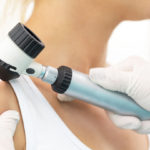With so many skin care tips on the Internet today, it’s sometimes hard to separate fact from fiction. As a highly regarded dermatology practice, we know a thing or two about skin care, so we’re going to cover five of the most common skin care myths. Knowing the truth can save your skin, your money, your time…and often, your health.
Myth 1: The more money you spend, the better the product.
Unfortunately for those high-priced creams and serums, this just isn’t necessarily true. There are plenty of products at drug stores that can work just as well or better than things costing hundreds of dollars. Often the tried and true drugstore products remain popular for a reason because for many people they work. That being said, not everything that is cheap will work for everyone. Seeing your dermatologist and discussing the best route to take for your skin can help you discover where you need to be spending more money and the places where you can use the cheaper options.
Myth 2: Sunscreen myths.
You could write an entire blog just on myths about sunscreen, but we’ll cover the three biggest myths.
- SPF: Too often people assume that because sunscreen has a high SPF (Sun Protection Factor) it must work better. A broad-spectrum sunscreen of at least 15 can protect you as well as an SPF 75 from the UVB rays which cause the skin to burn. SPF determines how long it would take your skin to burn with or without sunscreen. Say your skin burns after 10 minutes of exposure, but with sunscreen it doesn’t begin to burn for 150 minutes. To calculate the SPF you divide 150 by 10 and get an SPF of 15. All sunscreen should be reapplied every few hours no matter the SPF.
- Cloudy Days: Many people believe that if the sun isn’t out and it’s cloudy outside you don’t have to cover up with sunscreen. This is false because UV rays still break through the clouds to the Earth’s surface regardless of cloud coverage.
- Face makeup: Despite what your makeup may say, the SPF on the label is not really protecting your skin. You would have to use up to 15 times more makeup than the average person to get the actual SPF 10 or 15 the packaging promises. Be sure to put on sunscreen before makeup every day to protect from sun damage.
Myth 3: Antiaging products erase wrinkles.
Sadly, this just isn’t true. Most anti-aging products work by hydrating the skin, which makes it appear plumper and fuller than it is without moisture. This creates the appearance of younger, smoother skin. The best products for long-term improvement of wrinkles are those that contain retinol as an ingredient. Retinol helps to boost the skins ability to produce healthy cells, which retains elasticity in the skin. Prescription retinol products are the best because they contain a higher percentage of retinol. For those, however, you must see your dermatologist. All that being said, you actually can erase wrinkles with laser treatments; but again, you will need to see your dermatologist to determine which laser treatment is right for you.
Myth 4: The newer the product the better it works.
Many of the flashy, new products are just old products with a better marketing campaign. When shopping for a new skin care product, research what the best ingredients for your skin are, or see a dermatologist who is trained to let you know which ingredients will benefit your skin the most. Just because something has a new label doesn’t guarantee it can work any better than a product that’s decades old. Those staple products are usually still around for a reason, and it’s that they work for many people.
Myth 5: “Natural Ingredient”-based products are all safe.
Products that are all natural are very trendy in today’s drug stores. However, not everything that comes out of the ground is good for your skin. An “organic” product can contain an ingredient that you’re allergic to and cause a major reaction where you used it. Putting it on the skin (which is a very sensitive organ) can be a very bad idea if you’re not careful. And just because a product brags that its ingredients are natural has no connection to whether or not it’s good for the skin.
It’s easy to get swept up in a skin care myth, especially when it sounds as though it makes sense to you. Before committing to a decision based on hearsay, do some research to double check that what you heard is the truth. If you still have questions about the validity of something you heard call your dermatologist to verify whether it’s true or not.
Dermatology Associates offers a full spectrum of leading-edge medical, surgical, and cosmetic dermatology services from offices in Savannah and Vidalia.


